Abstract
Proguanil and pyrimethamine are antifolate drugs with distinct chemical structures that are used commonly in the prophylaxis and treatment of Plasmodium falciparum malaria. Clinical reports and field studies have suggested that some parasites refractory to proguanil can be treated with pyrimethamine, and vice versa. Analysis of the P. falciparum dihydrofolate reductase (DHFR) from different parasites reveals the structural basis for differential susceptibility to these antifolate drugs. Parasites harboring a pair of point mutations from Ala-16 to Val-16 and from Ser-108 to Thr-108 are resistant to cycloguanil (the active metabolite of proguanil) but not to pyrimethamine. A single Asn-108 mutation, on the other hand, confers resistance to pyrimethamine with only a moderate decrease in susceptibility to cycloguanil. Significant cross-resistance to both drugs occurs in parasites having mutations that include Ser-108----Asn-108 and Ile-164----Leu-164. These results reflect the distinct structures of pyrimethamine and cycloguanil and suggest fine differences in binding within the active site cavity of DHFR. Alternative inhibitors, used alone or in combination, may be effective against some strains of cycloguanil- or pyrimethamine-resistant malaria.
Full text
PDF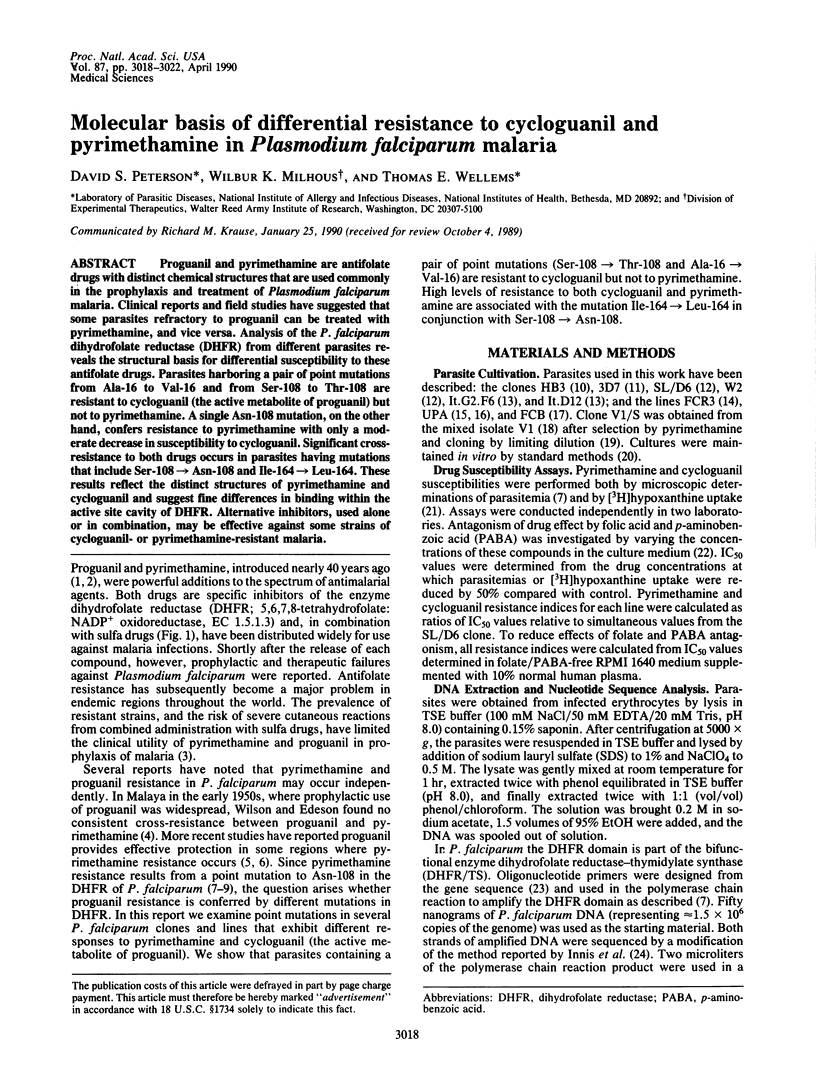
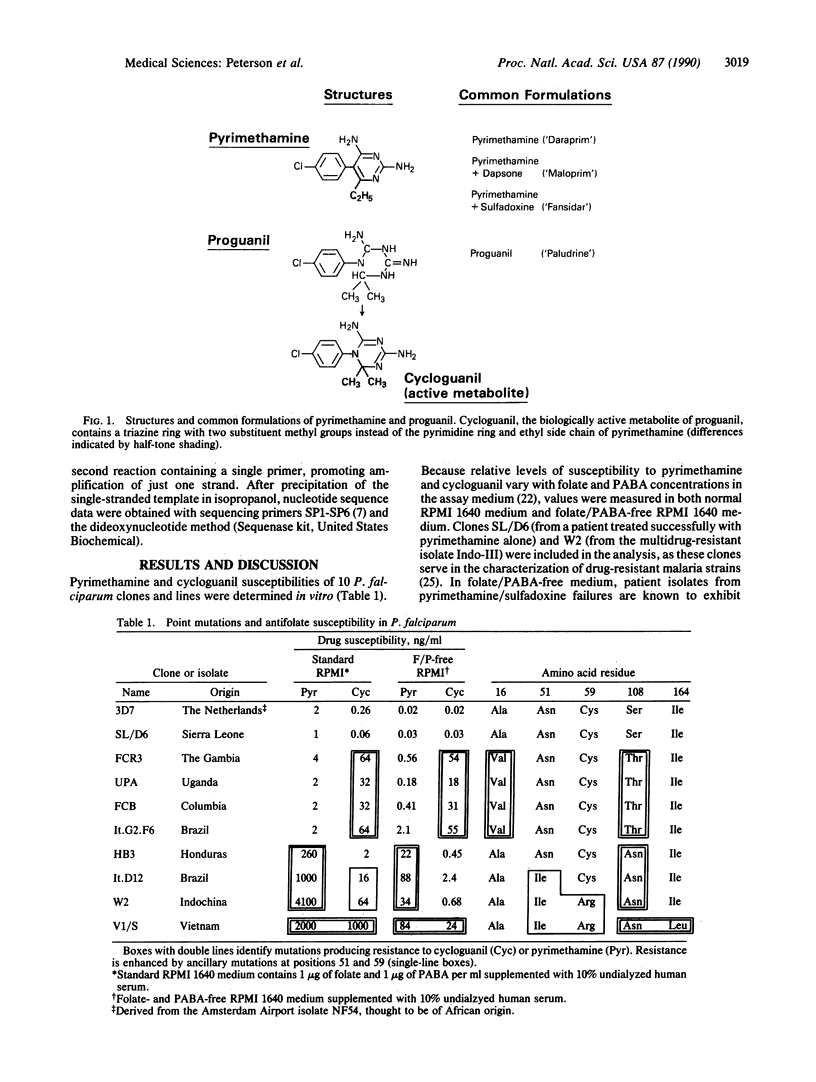
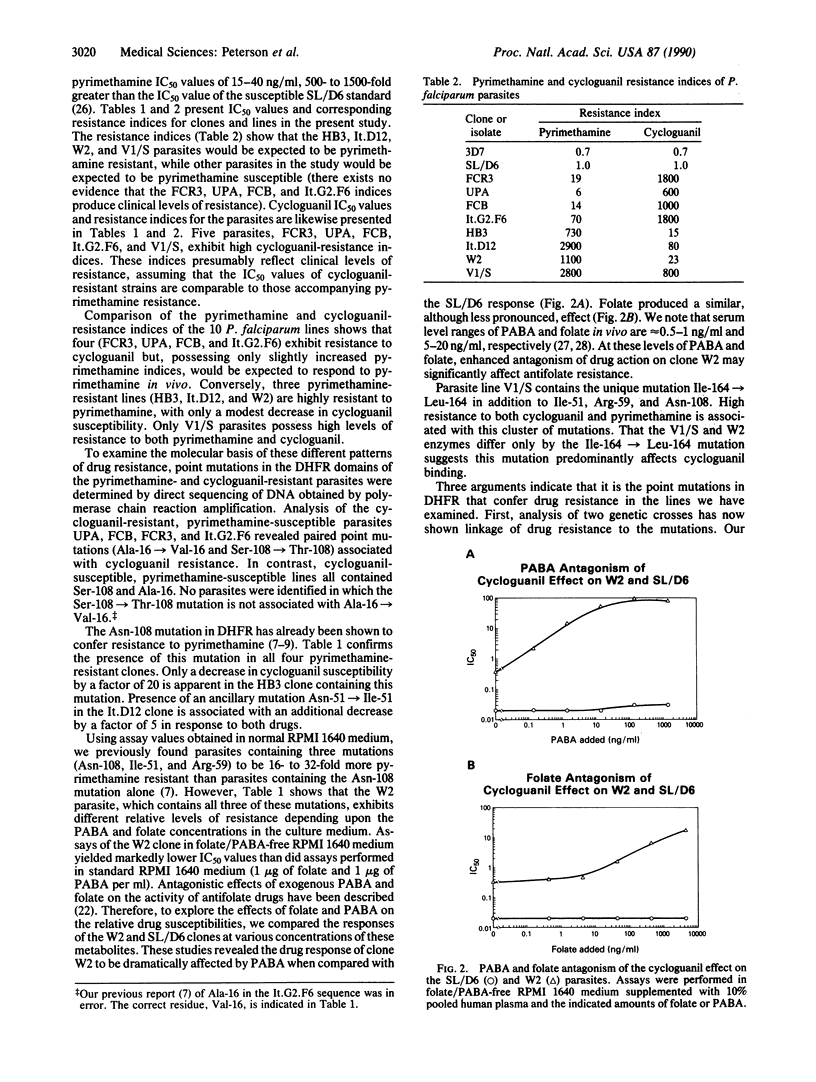
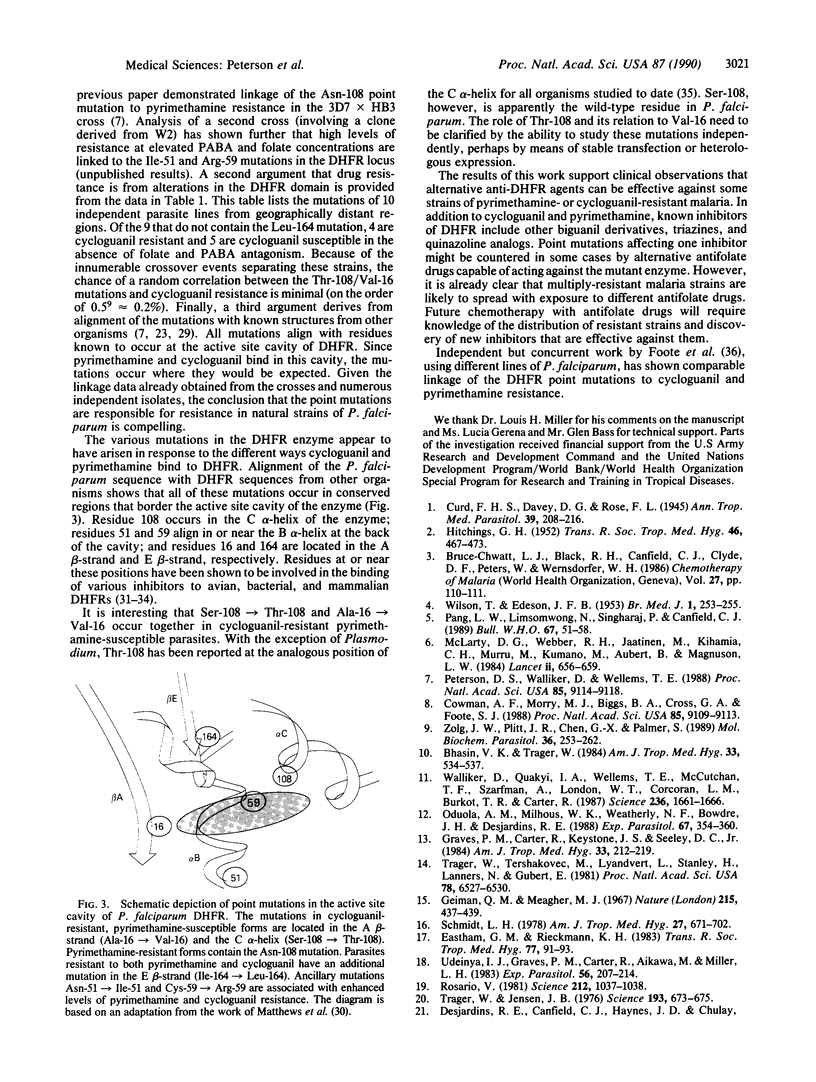
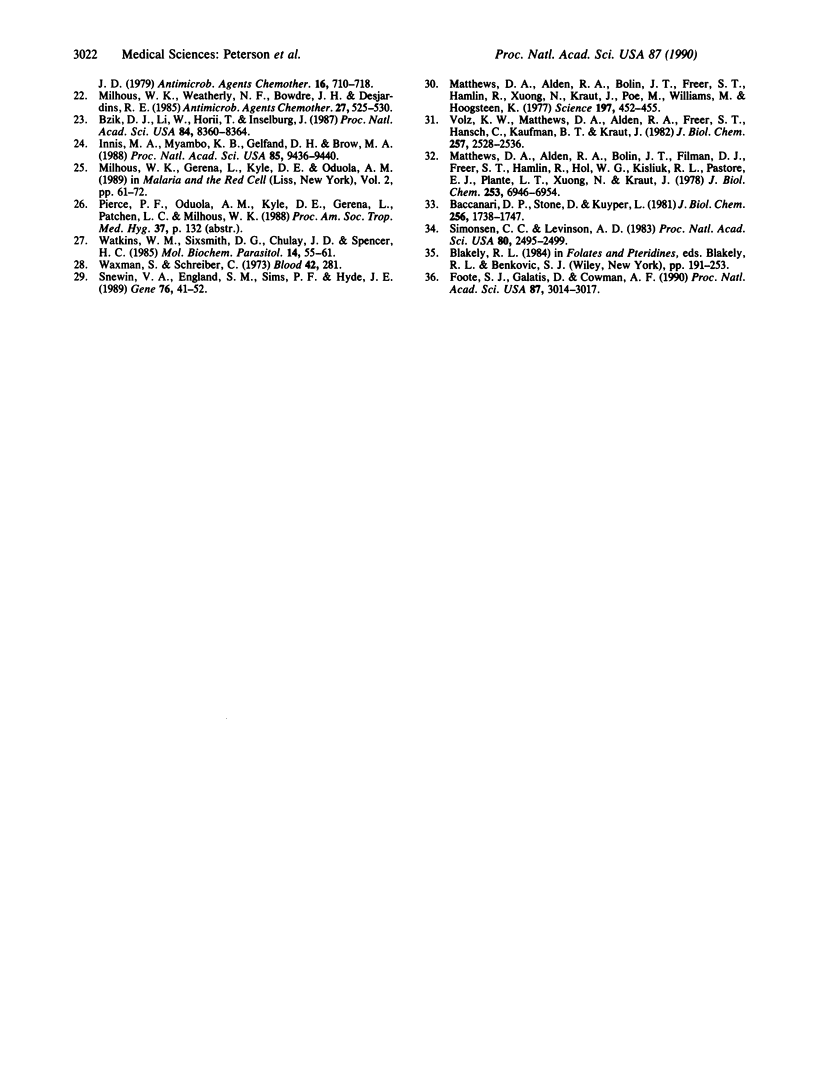
Images in this article
Selected References
These references are in PubMed. This may not be the complete list of references from this article.
- Baccanari D. P., Stone D., Kuyper L. Effect of a single amino acid substitution on Escherichia coli dihydrofolate reductase catalysis and ligand binding. J Biol Chem. 1981 Feb 25;256(4):1738–1747. [PubMed] [Google Scholar]
- Bhasin V. K., Trager W. Gametocyte-forming and non-gametocyte-forming clones of Plasmodium falciparum. Am J Trop Med Hyg. 1984 Jul;33(4):534–537. doi: 10.4269/ajtmh.1984.33.534. [DOI] [PubMed] [Google Scholar]
- Bzik D. J., Li W. B., Horii T., Inselburg J. Molecular cloning and sequence analysis of the Plasmodium falciparum dihydrofolate reductase-thymidylate synthase gene. Proc Natl Acad Sci U S A. 1987 Dec;84(23):8360–8364. doi: 10.1073/pnas.84.23.8360. [DOI] [PMC free article] [PubMed] [Google Scholar]
- Cowman A. F., Morry M. J., Biggs B. A., Cross G. A., Foote S. J. Amino acid changes linked to pyrimethamine resistance in the dihydrofolate reductase-thymidylate synthase gene of Plasmodium falciparum. Proc Natl Acad Sci U S A. 1988 Dec;85(23):9109–9113. doi: 10.1073/pnas.85.23.9109. [DOI] [PMC free article] [PubMed] [Google Scholar]
- Eastham G. M., Rieckmann K. H. The activity of pyrimethamine and sulphadoxine against Plasmodium falciparum determined by the in vitro microtechnique. Trans R Soc Trop Med Hyg. 1983;77(1):91–93. doi: 10.1016/0035-9203(83)90026-3. [DOI] [PubMed] [Google Scholar]
- Foote S. J., Galatis D., Cowman A. F. Amino acids in the dihydrofolate reductase-thymidylate synthase gene of Plasmodium falciparum involved in cycloguanil resistance differ from those involved in pyrimethamine resistance. Proc Natl Acad Sci U S A. 1990 Apr;87(8):3014–3017. doi: 10.1073/pnas.87.8.3014. [DOI] [PMC free article] [PubMed] [Google Scholar]
- Geiman Q. M., Meagher M. J. Susceptibility of a New World monkey to Plasmodium falciparum from man. Nature. 1967 Jul 22;215(5099):437–439. doi: 10.1038/215437a0. [DOI] [PubMed] [Google Scholar]
- Graves P. M., Carter R., Keystone J. S., Seeley D. C., Jr Drug sensitivity and isoenzyme type in cloned lines of Plasmodium falciparum. Am J Trop Med Hyg. 1984 Mar;33(2):212–219. doi: 10.4269/ajtmh.1984.33.212. [DOI] [PubMed] [Google Scholar]
- HITCHINGS G. H. Daraprim as an antagonist of folic and folinic acids. Trans R Soc Trop Med Hyg. 1952 Sep;46(5):467-73; discussion, 498-508. doi: 10.1016/0035-9203(52)90038-2. [DOI] [PubMed] [Google Scholar]
- Innis M. A., Myambo K. B., Gelfand D. H., Brow M. A. DNA sequencing with Thermus aquaticus DNA polymerase and direct sequencing of polymerase chain reaction-amplified DNA. Proc Natl Acad Sci U S A. 1988 Dec;85(24):9436–9440. doi: 10.1073/pnas.85.24.9436. [DOI] [PMC free article] [PubMed] [Google Scholar]
- Matthews D. A., Alden R. A., Bolin J. T., Filman D. J., Freer S. T., Hamlin R., Hol W. G., Kisliuk R. L., Pastore E. J., Plante L. T. Dihydrofolate reductase from Lactobacillus casei. X-ray structure of the enzyme methotrexate.NADPH complex. J Biol Chem. 1978 Oct 10;253(19):6946–6954. [PubMed] [Google Scholar]
- Matthews D. A., Alden R. A., Bolin J. T., Freer S. T., Hamlin R., Xuong N., Kraut J., Poe M., Williams M., Hoogsteen K. Dihydrofolate reductase: x-ray structure of the binary complex with methotrexate. Science. 1977 Jul 29;197(4302):452–455. doi: 10.1126/science.17920. [DOI] [PubMed] [Google Scholar]
- McLarty D. G., Webber R. H., Jaatinen M., Kihamia C. H., Murru M., Kumano M., Aubert B., Magnuson L. W. Chemoprophylaxis of malaria in non-immune residents in Dar es Salaam, Tanzania. Lancet. 1984 Sep 22;2(8404):656–659. doi: 10.1016/s0140-6736(84)91223-6. [DOI] [PubMed] [Google Scholar]
- Milhous W. K., Weatherly N. F., Bowdre J. H., Desjardins R. E. In vitro activities of and mechanisms of resistance to antifol antimalarial drugs. Antimicrob Agents Chemother. 1985 Apr;27(4):525–530. doi: 10.1128/aac.27.4.525. [DOI] [PMC free article] [PubMed] [Google Scholar]
- Oduola A. M., Milhous W. K., Weatherly N. F., Bowdre J. H., Desjardins R. E. Plasmodium falciparum: induction of resistance to mefloquine in cloned strains by continuous drug exposure in vitro. Exp Parasitol. 1988 Dec;67(2):354–360. doi: 10.1016/0014-4894(88)90082-3. [DOI] [PubMed] [Google Scholar]
- Pang L. W., Limsomwong N., Singharaj P., Canfield C. J. Malaria prophylaxis with proguanil and sulfisoxazole in children living in a malaria endemic area. Bull World Health Organ. 1989;67(1):51–58. [PMC free article] [PubMed] [Google Scholar]
- Peterson D. S., Walliker D., Wellems T. E. Evidence that a point mutation in dihydrofolate reductase-thymidylate synthase confers resistance to pyrimethamine in falciparum malaria. Proc Natl Acad Sci U S A. 1988 Dec;85(23):9114–9118. doi: 10.1073/pnas.85.23.9114. [DOI] [PMC free article] [PubMed] [Google Scholar]
- Rosario V. Cloning of naturally occurring mixed infections of malaria parasites. Science. 1981 May 29;212(4498):1037–1038. doi: 10.1126/science.7015505. [DOI] [PubMed] [Google Scholar]
- Schmidt L. H. Plasmodium falciparum and Plasmodium vivax infections in the owl monkey (Aotus trivirgatus). I. The courses of untreated infections. Am J Trop Med Hyg. 1978 Jul;27(4):671–702. doi: 10.4269/ajtmh.1978.27.671. [DOI] [PubMed] [Google Scholar]
- Simonsen C. C., Levinson A. D. Isolation and expression of an altered mouse dihydrofolate reductase cDNA. Proc Natl Acad Sci U S A. 1983 May;80(9):2495–2499. doi: 10.1073/pnas.80.9.2495. [DOI] [PMC free article] [PubMed] [Google Scholar]
- Snewin V. A., England S. M., Sims P. F., Hyde J. E. Characterisation of the dihydrofolate reductase-thymidylate synthetase gene from human malaria parasites highly resistant to pyrimethamine. Gene. 1989 Mar 15;76(1):41–52. doi: 10.1016/0378-1119(89)90006-1. [DOI] [PubMed] [Google Scholar]
- Trager W., Jensen J. B. Human malaria parasites in continuous culture. Science. 1976 Aug 20;193(4254):673–675. doi: 10.1126/science.781840. [DOI] [PubMed] [Google Scholar]
- Trager W., Tershakovec M., Lyandvert L., Stanley H., Lanners N., Gubert E. Clones of the malaria parasite Plasmodium falciparum obtained by microscopic selection: their characterization with regard to knobs, chloroquine sensitivity, and formation of gametocytes. Proc Natl Acad Sci U S A. 1981 Oct;78(10):6527–6530. doi: 10.1073/pnas.78.10.6527. [DOI] [PMC free article] [PubMed] [Google Scholar]
- Udeinya I. J., Graves P. M., Carter R., Aikawa M., Miller L. H. Plasmodium falciparum: effect of time in continuous culture on binding to human endothelial cells and amelanotic melanoma cells. Exp Parasitol. 1983 Oct;56(2):207–214. doi: 10.1016/0014-4894(83)90064-4. [DOI] [PubMed] [Google Scholar]
- Volz K. W., Matthews D. A., Alden R. A., Freer S. T., Hansch C., Kaufman B. T., Kraut J. Crystal structure of avian dihydrofolate reductase containing phenyltriazine and NADPH. J Biol Chem. 1982 Mar 10;257(5):2528–2536. [PubMed] [Google Scholar]
- WILSON T., EDESON J. F. B. Treatment of acute malaria with pyrimethamine. Br Med J. 1953 Jan 31;1(4804):253–255. doi: 10.1136/bmj.1.4804.253. [DOI] [PMC free article] [PubMed] [Google Scholar]
- Walliker D., Quakyi I. A., Wellems T. E., McCutchan T. F., Szarfman A., London W. T., Corcoran L. M., Burkot T. R., Carter R. Genetic analysis of the human malaria parasite Plasmodium falciparum. Science. 1987 Jun 26;236(4809):1661–1666. doi: 10.1126/science.3299700. [DOI] [PubMed] [Google Scholar]
- Watkins W. M., Sixsmith D. G., Chulay J. D., Spencer H. C. Antagonism of sulfadoxine and pyrimethamine antimalarial activity in vitro by p-aminobenzoic acid, p-aminobenzoylglutamic acid and folic acid. Mol Biochem Parasitol. 1985 Jan;14(1):55–61. doi: 10.1016/0166-6851(85)90105-7. [DOI] [PubMed] [Google Scholar]
- Waxman S., Schreiber C. Measurement of serum folate levels and serum folic acid-binding protein by 3H-PGA radioassay. Blood. 1973 Aug;42(2):281–290. [PubMed] [Google Scholar]
- Zolg J. W., Plitt J. R., Chen G. X., Palmer S. Point mutations in the dihydrofolate reductase-thymidylate synthase gene as the molecular basis for pyrimethamine resistance in Plasmodium falciparum. Mol Biochem Parasitol. 1989 Oct;36(3):253–262. doi: 10.1016/0166-6851(89)90173-4. [DOI] [PubMed] [Google Scholar]




